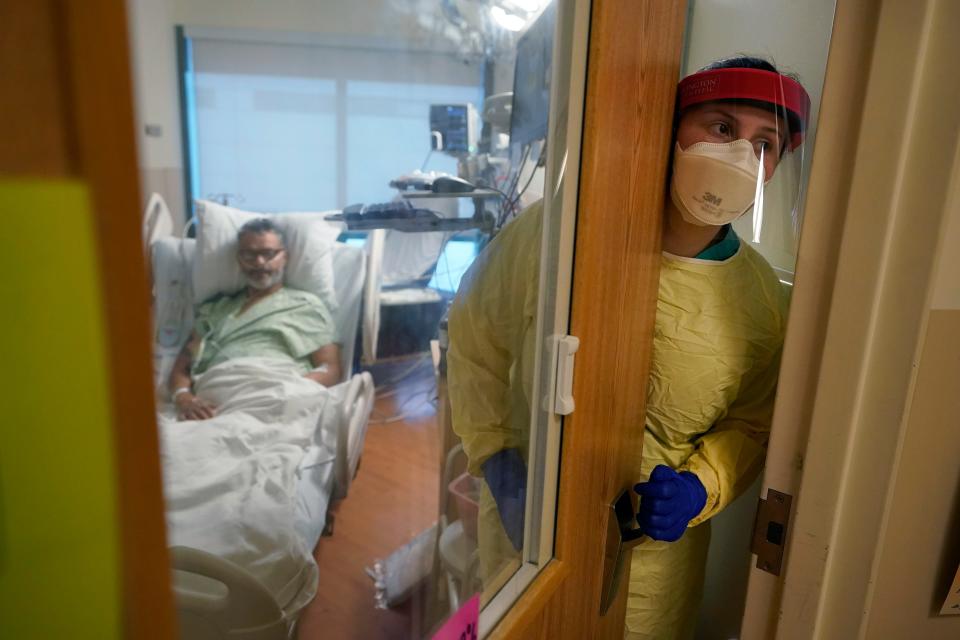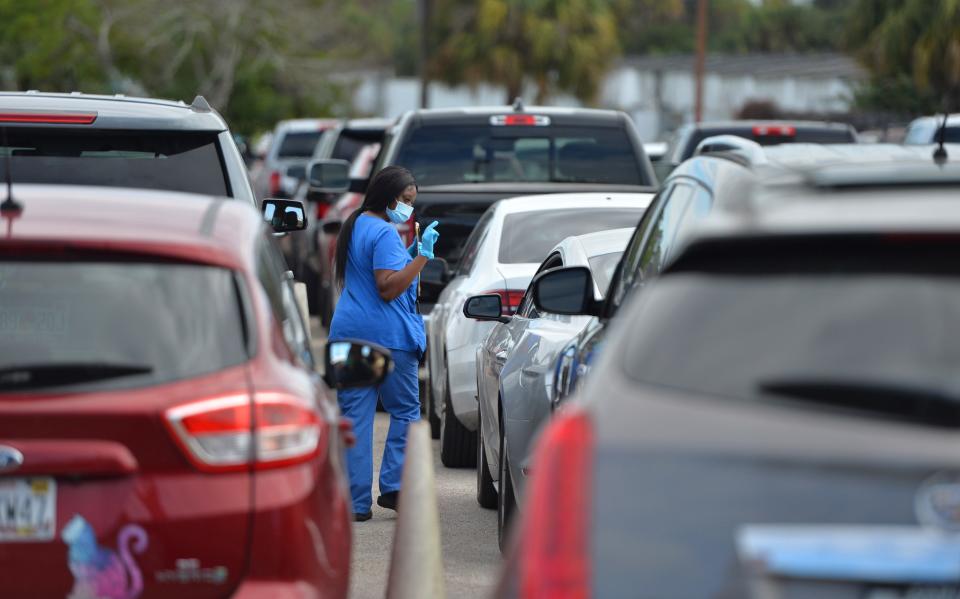Treatment shortages, packed hospitals: Why at-risk adults should be on COVID alert
As the coronavirus tears across America, it is a particularly bad time for high-risk people to catch COVID-19.
And that means a lot of Americans are vulnerable. Nearly 40% of U.S. adults are considered at high risk for a serious infection because they're over 65, are carrying extra pounds or have certain medical conditions.
"It's a tough time, a challenging time," said Dr. Ali Khan, a chief medical officer with Oak Street Health, a national network of primary care centers specializing in vulnerable patients.
Khan, who is based in Chicago, said he'd like to keep more of his patients out of emergency rooms, but he simply doesn't have the tools right now. In Illinois, one of 20 states his network serves, doctors have access to just 100 courses of one of the two antivirals, he said.
At the same time, hospitals are nearly overwhelmed with patients, including those with COVID-19 as well as other ailments.
OVERBURDENED HOSPITALS: As COVID-19 surges, there's no hospital bed for others in need of care
And though there are good treatments to prevent infected people from needing hospital care, including two that have been recently approved, they are almost totally unavailable across the country.
Two of the three monoclonal antibodies shown to help prevent hospitalizations don't work against the omicron variant that now accounts for more than 95% of cases nationwide. Many hospitals have stopped offering those entirely.

"Right now, we've got nothing else to treat ambulatory patients with COVID," said Dr. Jeanne Marrazzo, who directs the division of infectious diseases at the University of Alabama at Birmingham. "We have no monoclonals right now. We don't have the oral drugs yet and we don't have any other options – so it's really really important to try to protect yourself."
The one monoclonal antibody that's still effective against omicron, called sotrovimab, is also the one that's least available.
GlaxoSmithKline and Vir Biotechnology announced Tuesday that they had sold an additional 600,000 doses of sotrovimab to the U.S. government to be delivered by March 2022, bringing the total doses bought by the government to 1 million.
But the country reported more than 1.3 million cases of COVID-19 on Monday alone, so even those additional doses will go fast.
"There's clearly a huge mismatch between the demand because of the sheer number of cases of omicron and the supply of this one simple monoclonal antibody," said Dr. Joshua Barocas, an infectious disease expert at the University of Colorado School of Medicine Anschutz.
Marrazzo said her facility had just 16 doses of sotrovimab available last week. "We don't have anything," she said in a media call Tuesday with Barocas set up by the Infectious Disease Society of America.
CORONAVIRUS RESOURCE GUIDE: What you need to know
At Massachusetts General Hospital, the situation is much the same: Monoclonal antibodies are reserved for those most at risk, said Dr. Richelle Charles, an infectious disease physician who joined a media briefing Tuesday by the Massachusetts Consortium on Pathogen Readiness.
In the fall, anyone who was even a little overweight or over 50 would be immediately given monoclonal antibodies to prevent their infection from getting worse, said Dr. Dorry Segev, a transplant surgeon and epidemiologist at Johns Hopkins University.
"Now, you have to be incredibly high-risk and it's only for treatment (not prevention), because we have so little supply," he said.

When one of his transplant patients comes down with omicron, he has been "desperately" trying to find a dose of sotrovimab to give them. "It's critical for them," he said, because many transplant recipients don't get good protection from vaccines.
Antivirals
Antiviral pills that were authorized by the Food and Drug Administration last month and are expected to transform treatment for COVID-19 are just becoming available. Marrazzo and Barocas said their institutions have not yet received any doses.
The lack of availability also raises equity questions, Dr. Daniel McQuillen, president of the Infectious Diseases Society of America, and Dr. Marwan Haddad, chair of the HIV Medicine Association, said in a statement Thursday.
"We are concerned that the scarce supply of these new oral therapies could worsen health disparities that have persisted during the pandemic unless there is close monitoring to ensure equitable distribution," they said.
They urged state and local authorities to distribute the drugs to sites that serve or are accessible to people who are uninsured, Black, Indigenous, people of color, immigrants and other historically underserved populations.
Community health centers and skilled nursing facilities should be a part of state distribution plans, they said. Distributing primarily through retail pharmacies "can create barriers to populations already more likely to experience disparities" because of identification and health insurance requirements.
"Although we have a limited supply of therapies effective at reducing serious illness and death due to the COVID-19 Omicron variant," they wrote, "we can take steps to maximize their benefit by distributing them to those in greatest need, guided by principles of equity and inclusivity."
More doses to come
There's hope that the shortage will be short-lived, Segev and others said.
"It's starting to get better, but it's not there yet," said Dr. Daniel Griffin, an infectious disease specialist at Northwell Health on Long Island.
Griffin said there are about 3,000 doses of antivirals available a week for all of New York state – and it could probably use 300,000.
He predicts the situation will change by March, when more drugs will be available, cases will have fallen and physicians and pharmacists will understand which patients will most benefit from which treatment.
"I think it's going to get better," he said. "I can't imagine it getting worse."
More drugs are also in the pipeline.
The federal government is funding a trial of another monoclonal antibody designed to keep people out of the hospital, presidential COVID-19 adviser Dr. Anthony Fauci said in a briefing Wednesday.
The government has also been increasing its orders for drugs like sotrovimab and the antivirals.
Remdesivir, an antiviral that has been used for hospitalized patients, is also being made available to those earlier in the course of their disease. A three-day course has been shown to prevent hospitalizations. But it's not yet widely available either and has to be delivered by infusion either in the person's home or to someone who can come back to a facility three days in a row.
"We would love to be connecting our patients to outpatient remdesivir," Khan said. "That has not been readily available across most of our 20 states."
Even though the best tools for preventing disease are in short supply, Barocas said he feels as if medical care is in a totally different place now than it was in March 2020.
"I felt helpless," he said of that time. "I felt that absolutely all I was doing was shuffling deck chairs and trying to keep a boat afloat at the same time."
Now there are preventive measures and treatments and viral surveillance to help understand where infections are headed, he said.
"I can go to the hospital, and no matter how overwhelmed and how exhausted we all are, it's a vastly different landscape."
Contact Karen Weintraub at kweintraub@usatoday.com.
Health and patient safety coverage at USA TODAY is made possible in part by a grant from the Masimo Foundation for Ethics, Innovation and Competition in Healthcare. The Masimo Foundation does not provide editorial input.
This article originally appeared on USA TODAY: Omicron treatment, packed hospitals: High-risk adults on COVID alert


